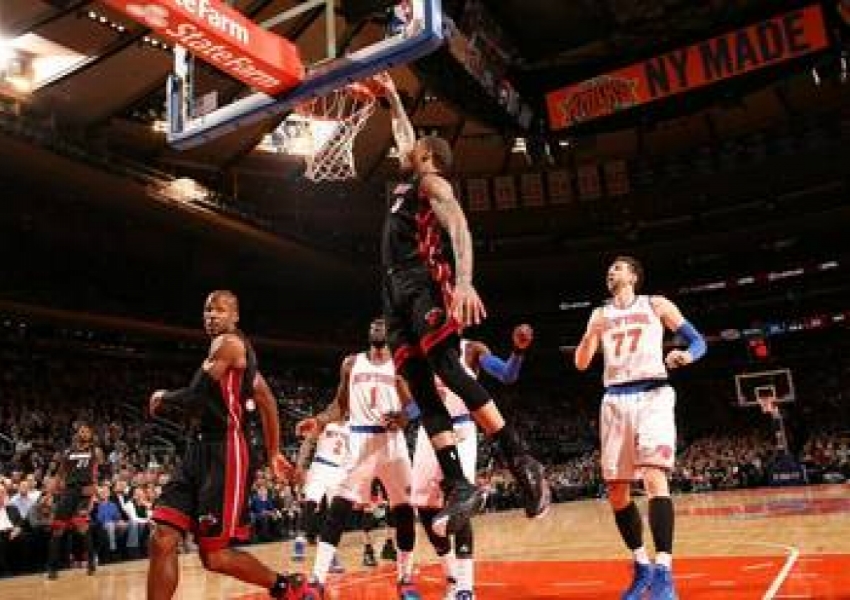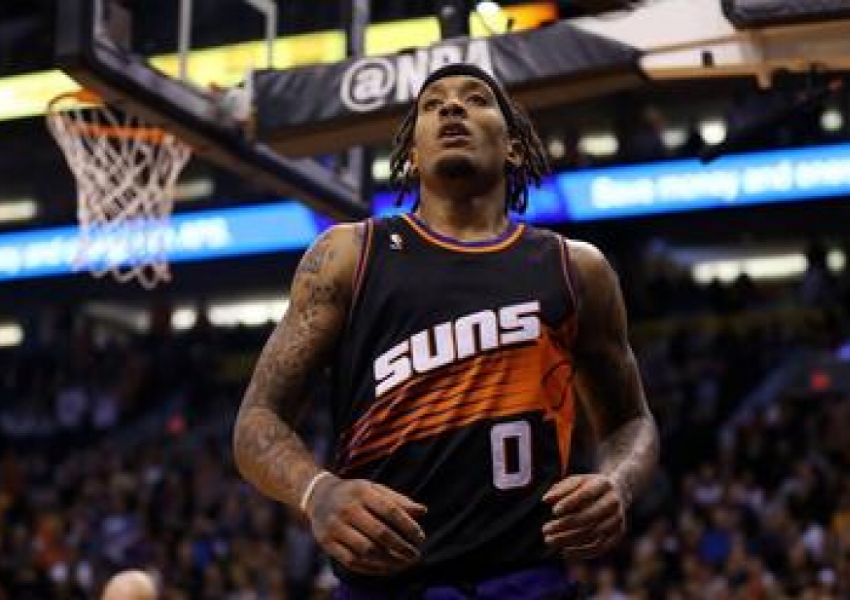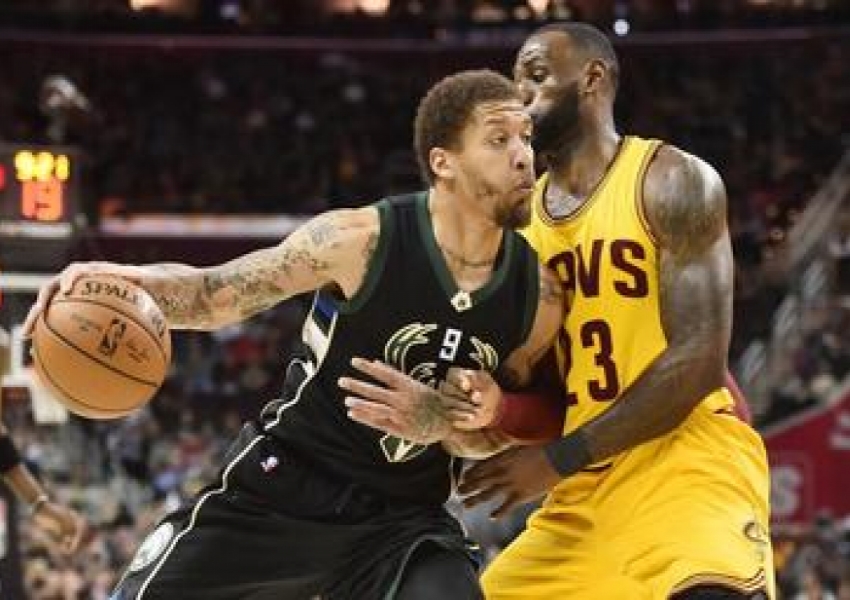A Talent Beyond LeBron, Offense Beyond Durant: The Rise and Fall of Michael Beasley, the NBA’s Most Recognized Wasted Talent
When Josh Hart was asked who the most talented player he has ever seen in the NBA was, he didn’t hesitate. The answer came quickly, as if it was a known fact. “Michael Beasley,” Hart said, unequivocally. When the host pointed out that Hart had played alongside LeBron James, Hart quickly clarified: “Yes, LeBron is the best when it comes to all-around play, and Durant might be the greatest one-on-one scorer in history, but in a one-on-one game, Beasley is untouchable. I train with him every summer, and there’s no one who can beat him.” Hart’s statement instantly took everyone back to the mid-2000s, a time when Michael Beasley was heralded as one of the most promising young talents the NBA had ever seen.

Beasley’s name echoes with nostalgia among basketball fans who remember the raw potential he displayed in his younger years. Drafted second overall by the Miami Heat in 2008, the expectations surrounding Beasley were immense. Even Pat Riley, the legendary Heat president, described him as a “once-in-a-decade talent.” And yet, despite these glowing assessments, Beasley’s NBA career never lived up to its promise. By 2011, Beasley had already played for seven different NBA teams and spent a brief stint in the Chinese Basketball Association (CBA), with a career average of only 12.4 points per game. His time in the league was filled with flashes of brilliance but mostly plagued by underachievement, inconsistency, and behavioral issues.

Born in Frederick, Maryland, Beasley’s early life was filled with struggles. Raised by his mother, Fatimah Smith, a single parent who juggled the responsibility of caring for five children, Beasley’s childhood was marked by constant relocation—moving from Maryland to Pennsylvania to Kansas. The instability of his early life created a sense of insecurity in him, and basketball became his only refuge. It’s no secret that Beasley’s raw talent was immense from a young age, but his lack of discipline and stability ultimately became his undoing. As a child prodigy in basketball, Beasley dominated his peers. At just 12 years old, he was playing against high schoolers and easily winning. His game was far more developed than that of most players his age.

In high school, Beasley’s dominance continued. He played for six different teams, but no matter where he went, his presence was felt. His high school career was an incredible 138 wins and only 5 losses, with his senior year marked by a perfect 40-0 record. Averaging 28 points, 16 rebounds, 4 assists, and 4.5 blocks per game, Beasley led his team to a national championship. At the McDonald's All-American Game, he dropped 23 points and 12 rebounds, earning the MVP award. Beasley was dubbed the “genius of talent,” a term that would soon follow him to the NCAA.
His college career at Kansas State was similarly dazzling. Despite being younger than most of his opponents, Beasley averaged 26.3 points per game (third in the nation) and 12.4 rebounds (first in the nation). He shattered records, including breaking Carmelo Anthony’s single-season double-double mark. His offensive arsenal was unparalleled for a player of his size (6'8", with a wingspan of 7'1"), combining guard-like skills and speed with the low-post game of a traditional big man. He was considered by many to be the most complete offensive player in college basketball.
When Beasley entered the 2008 NBA Draft, the Miami Heat selected him second overall, immediately after Derrick Rose. The excitement surrounding his potential was palpable. Pat Riley, often a man of few words, openly praised Beasley, calling him “one of the most talented players I’ve seen in a long time.” It seemed like the perfect storm: Beasley’s immense skill paired with Riley’s leadership could have been the foundation for a new era in Miami.
But as we all know, things didn’t go as planned. Beasley’s first few years in the NBA were filled with disappointment. He struggled with consistency and was often criticized for his lack of effort. His defensive game was underdeveloped, and he had trouble fitting into Miami’s system. As the team’s focus shifted toward building a championship contender around Dwyane Wade, Beasley found himself relegated to a lesser role. By the 2010 offseason, the arrival of the Heat's "Big Three" (Wade, LeBron James, and Chris Bosh) made Beasley expendable. The Heat traded him to the Minnesota Timberwolves, marking the beginning of Beasley’s nomadic NBA career.
Beasley’s time with the Timberwolves was no more successful. His inconsistent play, combined with his lack of commitment to improving his game, meant that he was never able to meet the expectations set for him as a former No. 2 overall pick. He was bounced from team to team, playing for the Phoenix Suns, the Houston Rockets, and the Miami Heat once more. Each time, Beasley seemed to be on the verge of breaking out, but he never fully realized his potential. He had brief moments of brilliance, but they were always fleeting.
The reasons for Beasley’s failure to live up to his immense potential are numerous, but three factors stand out. The first is his personality and lack of discipline. Beasley was known for his free-spirited nature, but his lack of commitment to the game became his greatest downfall. He was often late to practice and had a habit of napping during team meetings. His casual approach to the game was a far cry from the discipline and work ethic required to succeed at the NBA level. It seemed that Beasley thought his natural talent alone would carry him, not realizing that success in the NBA demands more than just physical gifts. He also faced off-court issues, including two stints in rehab and a suspension for violating the league's drug policy.
The second reason for Beasley’s failure to thrive in the NBA was his stagnant game. While he was an incredible scorer, his offensive game largely revolved around mid-range jumpers and post moves, which were becoming less effective in the modern NBA. The game was evolving toward three-point shooting, and Beasley never adapted his game to keep pace with these changes. He didn’t work on his defense, which left him as a liability on that end of the floor, and never developed the range or skill set necessary to be a versatile offensive weapon in today’s game.
Lastly, Beasley’s opportunities in the NBA were limited. After being traded from Miami to Minnesota, he was never given a chance to be the focal point of a team. Whether with the Timberwolves, the Suns, or the Rockets, Beasley was always viewed as a role player, not as a team’s centerpiece. This lack of stability and opportunity kept him from ever truly finding his rhythm in the league. The tragic passing of his mother in 2018 left Beasley emotionally shattered, and his battle with depression further complicated his ability to stay focused on basketball.
Despite all this, Beasley’s story is not one of complete failure. He still managed to carve out a career in professional basketball, playing in the BIG3 league, where he remains a force to be reckoned with. His game, though far from the heights it once seemed destined for, still carries the remnants of greatness. He remains one of the most naturally gifted players ever to touch a basketball, and in private pickup games, he still dominates many NBA stars.
Beasley’s story is a cautionary tale about the difference between raw talent and the discipline required to harness it. It’s a reminder that in basketball—and in life—attitude is often just as important as ability. As ESPN’s Bill Simmons once put it, “Michael Beasley should have been a transcendent scorer, but he never learned how to be a professional player.”
Today, at 35 years old, Beasley remains a figure of intrigue. He may never have become the superstar many once expected, but his story is a poignant reminder that talent alone can’t guarantee success. In the NBA, the difference between a legend and a “what could have been” is often not just skill, but heart, work ethic, and the ability to grow. Beasley’s career will forever be remembered as one of the most tragic wastes of potential in basketball history.
Copyright Statement:
Author: focusnba
Source: FocusNBA
The copyright of this article belongs to the author. Reproduction is not allowed without permission.
Recommended Blog
- First to Go? Lakers’ Trade Plans Signal the End of the Road for Dalton Knecht
- Matching Greatness: Just How Special Has Jalen Brunson Been in These Playoffs?
- Dominating the Lakers: Just How Good Is Julius Randle in the Playoffs?
- Lakers Sent Packing in Round One: Who’s Really to Blame?
- $297 Million for 22-Year-Old Paolo Banchero — Is He Worth It?
- Farewell Milwaukee: The Bucks Are Stuck, and Giannis' Next Chapter Awaits
- From #1 High School Player in America to the NBA's Toughest Enforcer: What Did Isaiah Stewart Go Through?
- -44 Plus A Disastrous Performance: Is Tyler Herro Really the Face of the Miami Heat?
- What Defines Genius? From Guard to Center, Overcoming a 50% Decrease in Talent, Yet Still Becoming a Top NBA Star
- Best Sixth Man? Just How Good Is Payton Pritchard, Who Earns $6.7 Million a Year?